25 Year All Stars: Meet Scarlet
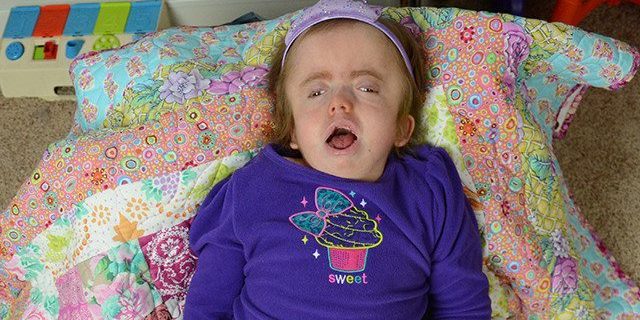
Jenny and her husband Thomas always knew there was a chance their children would have special medical needs. As a child, Thomas had hereditary retinoblastoma (eye cancer), meaning there was a 50% chance that any children they had would also have this condition.
When Jenny became pregnant with Scarlet, testing didn’t show any sign of retinoblastoma – but an ultrasound did show that her kidneys were enlarged and there may be issues with her brain and heart. Doctors followed her closely throughout the pregnancy and once Scarlet was born, she spent a month in the NICU while working through issues with her breathing and kidney function. Once those were resolved she needed to have a feeding tube placed, but finally Scarlet was able to go home.
“But they told us her brain was normal, and she had just had a rough start but would get past it,” remembered Jenny.
Finding the answers
The first year home with Scarlet was the most complex – filled with discoveries, surgeries, and trying to determine the cause of aspiration, seizures and respiratory apnea issues.
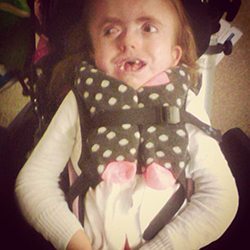 “It just kept snowballing, one thing after another,” said Jenny. “We didn’t sleep – the first year was a complete blur. I lost count of how many days she was in the hospital – close to half or more.”
“It just kept snowballing, one thing after another,” said Jenny. “We didn’t sleep – the first year was a complete blur. I lost count of how many days she was in the hospital – close to half or more.”
Scarlet was finally diagnosed at three and a half years old, thanks to a geneticist who has read about this condition prior to ever meeting Scarlet, and recognized it in her as soon as they walked into his office. Their neurologist’s genetic tests were submitted, and it was confirmed – she had Schinzel-Giedion syndrome. She was one of only a handful of cases in the world. As far as Jenny is aware, Scarlet is still the only diagnosed patient in the state of Minnesota.
“I think we know every family dealing with this condition personally,” added Jenny.
A consistent presence
To keep Scarlet healthy and at home, PHS has been taking care of her medical needs from the beginning – currently providing equipment and supplies, infusion nursing & pharmacy, home care nursing, and nutrition services.
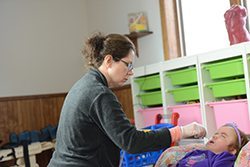 “PHS has always provided equipment and services at home for us,” mentioned Jenny. “I can’t imagine what life would be like without PHS. We didn’t have home care nursing until she was a little over a year old (at first receiving it from another agency), and that was very tough – now, she’s very rarely in the hospital, and we’re able to function as a family.”
“PHS has always provided equipment and services at home for us,” mentioned Jenny. “I can’t imagine what life would be like without PHS. We didn’t have home care nursing until she was a little over a year old (at first receiving it from another agency), and that was very tough – now, she’s very rarely in the hospital, and we’re able to function as a family.”
A lot of caring for Scarlet has meant figuring out what works for her, and what doesn’t. And since the average life expectancy for her diagnosis is two years old and Scarlet is currently five, she’s paving the way for new families who will walk down this path as she serves as the ‘older generation’ of this syndrome.
“We all try to support and help each other, but each child with this diagnosis can be so different,” commented Jenny.
Differences in support
 This has served as a huge contrast to the situation Jenny and Thomas experienced with Scarlet’s brother, Fritz.
This has served as a huge contrast to the situation Jenny and Thomas experienced with Scarlet’s brother, Fritz.
Jenny also had genetic testing done when she was pregnant with her second child, Fritz, due to his same chance of developing retinoblastoma. When he tested positive, he was delivered early and treated immediately.
“We didn’t really have a community of families to help us cope until after Scarlet was diagnosed, and even then her condition is so rare that the support system isn’t all that widely spread,” said Jenny. “It was very strange to first walk this path with her and then encounter the amount of support we did for Fritz’s cancer diagnosis.”
A team of educators
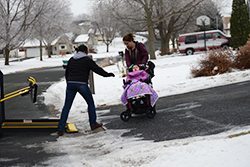 Scarlet spends three days a week at school with a team comprised of teachers, a speech therapist, an occupational therapist, and a physical therapist. They’ve worked on her with communicating her wants and needs, using methods such as using her eyes to select the choice she prefers, and using switches with the tiny movement of a finger.
Scarlet spends three days a week at school with a team comprised of teachers, a speech therapist, an occupational therapist, and a physical therapist. They’ve worked on her with communicating her wants and needs, using methods such as using her eyes to select the choice she prefers, and using switches with the tiny movement of a finger.
This year, Scarlet will be going to elementary school through her district, amazing the doctors who didn’t think she would be able to communicate as well as her family who is so glad they decided to send Scarlet to school.
Enjoying the everyday
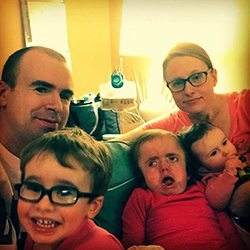 For Jenny and her family, the most important thing is to give Scarlet as many experiences and opportunities as possible. Now a family with three children, Scarlet is outliving the expectancy for her diagnosis, Fritz is doing great after his retinoblastoma diagnosis, and their youngest was born without any special medical needs.
For Jenny and her family, the most important thing is to give Scarlet as many experiences and opportunities as possible. Now a family with three children, Scarlet is outliving the expectancy for her diagnosis, Fritz is doing great after his retinoblastoma diagnosis, and their youngest was born without any special medical needs.
“We had always wanted to take her to Disney World and all of those things, but I don’t know if that’s really what it’s about for her,” said Jenny. “She wants to be with her family, and do the day to day normal stuff of going to school and experiencing life.”
Scarlet has shown people how much she is made of and just how much of a fighter she truly is – and we have no doubt that will remain as she continues to break barriers and lead the way for others with Schinzel-Giedion syndrome.
Originally published: September 1, 2015

